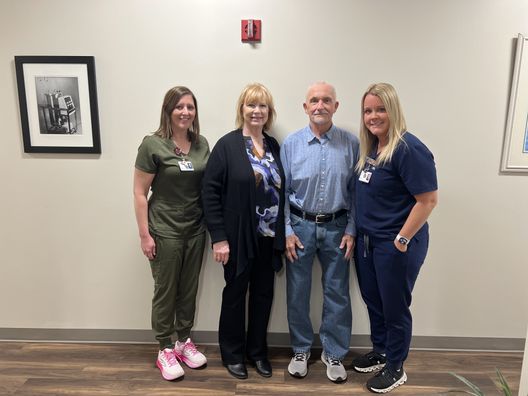This month is Autism Acceptance Month, a time to give people a chance to educate themselves on what autism is and what it means to those who were diagnosed with it. QMG Pediatric Neuropsychologist Dr. Sandra Clark works closely with kids of all ages and their families. We spoke to her to learn more.
What is autism?
“Very broadly, autism is characterized by foundational difficulties with social interaction and the presence of repetitive interests and behaviors. Every individual with autism is different and can show difficulties in these two areas very differently, but all show differences in their development of social interaction skills and rigidity in some areas of their behaviors more so than individuals who do not have autism. It is what we call a neurodevelopmental condition, which means that it is a difference in how the brain takes in and uses information, changes how children develop skills such as language, and is present from a very young age. I tell parents that their child sees the world in a way that is different than what we would expect from our own experiences, which at times leads to challenges, but can also be pretty amazing for making us stop and see the world a bit differently too.”
What are the early signs of autism?
“One of the first and most common signs of autism that parents notice is delayed language development. However, we are designed to be social creatures, and babies start engaging in social communication WAY before they develop speech. By six months old babies should be smiling at others, watching their parents’ faces, making eye contact, and showing interest in what others are doing. All of those are the foundation for social interaction, and without that interest in watching and learning from others, they are also likely to have delays in speech and other important social skills that are characteristic of autism spectrum disorder. Most parents know that their child should be starting to say single words between 12 – 16 months of age, but children directly communicate their needs to others using nonverbal communication before that. If your child is not starting to speak and is also not pointing to or holding things up to show you, those are earlier signs of autism more so than just speech delays. Repetitive interests and behaviors are sometimes more difficult to spot in very young children. Stereotyped movement such as hand flapping can be a sign of autism, and something to bring up with their doctor if you see it excessively. Repetitive play interests are another sign that can be hard to tease apart between neurotypical play in young children and a child with autism. There are different reasons children may not play with toys appropriately, specifically lining them up rather than playing with them. However, if they are more interested in parts of toys, such as the propeller of a plane rather than the whole plane as a toy, or taking toys apart rather than playing with them, and only play with toys in unusual ways, those are more clear signs of autism.”
A more simple list of concerns to contact a child’s pediatrician about:
- not making eye contact
- no smiling at others by 6 months of age
- not babbling, pointing, or meaningful gestures by 12 months
- not using 2‑word phrases by 24 months of age
- not showing items to others or sharing their interests with others
- no one-word communication by 16 months of age
- not responding to voices or their name being called
- using or focusing on parts of toys or objects
How is autism diagnosed?
“Autism is diagnosed by seeing a professional who is trained to use different sources of information to tease apart symptoms of autism and how they overlap with other potential concerns. They collect background information from parents about early development and milestones, have parents rate characteristics of social behavior they see at home and with others, ask teachers or daycare providers about what they see in settings outside the home, and also complete an assessment that uses different tasks to see how the child engages in social communication with others. The assessment is a ‘snapshot’ of the child’s behavior, so information from parents and other caregivers is a very important part of the evaluation. Similarly, parents and caregivers might not know which things they are seeing are important or how to interpret their concerns, so having the child complete assessments in the clinic with a trained professional is very important as well. A thorough evaluation that considers all of those sources of information is most appropriate.
The brain doesn’t know ‘boxes’ that we use for understanding how we work, so labels like ‘autism’ and ‘AD/HD’ and ‘anxiety’ among others are all terms that we use to help us explain and understand certain types of behaviors and how to address them. However, there is not an ‘autism’ box in the brain, and symptoms of autism also overlap with other conditions. Especially when children are very young, their neurological system sometimes hasn’t developed enough for us to clearly see that lining toys up is a symptom of their anxiety, or that lack of attention to others may be AD/HD. However, there are often clear signs that a professional can use to determine that autism is present and that early identification and intervention for autism spectrum disorder is very important. Early intervention is most strongly correlated with development of important skills, so it is very important to have autism assessed for early, to understand why a child is showing delays and what strategies will be most effective for them.”
What is “the spectrum”?
“Autism is not a simple condition that we can scan the brain or complete a genetic test and easily identify that an individual has it. There are not causes that apply to all or even most children with autism, there are a variety of genes that might be associated with autism, and environmental factors that may make it more or less likely for a child to show symptoms of autism. Because there are so many ‘routes’ leading an individual to signs of autism, there is a range of how autism presents in each person. That is why autism there is a ‘spectrum disorder.’ Social communication difficulties, for example, might present as delays in developing language for many children, but for others speech develops at a ‘typical’ or even advanced rate, though they may struggle to understand how to use language meaningfully to have back and forth conversations with others. Repetitive interests and behaviors may consist of focusing on trains for hours on end without interest in other things for one child, but also might look like a little girl obsessed with My Little Pony and not an obvious difference from others. Many refer to children as being ‘high functioning’ or ‘low functioning,’ and parents often ask me ‘where is my child on the spectrum.’ We talk about the severity of autism symptoms in terms of how much support they need to function in their daily environments, but the simple terms for low and high functioning are not good ones for describing any individual with autism. One individual may have high language skills and intelligence but struggle in interactions with peers in school or their job. Another may be gifted in their ability to understand how things they see fit together and skills for solving visual puzzles, but struggle with language. Just like individuals who do not have autism, they are individuals with their own sets of interests and abilities, and each person experiences autism differently from the next.”
What are the next steps after receiving a diagnosis of autism?
“This depends a great deal on how old an individual is when they receive a diagnosis. Research has shown that young children who receive early intervention are more likely to have outcomes with more independence and higher emotional wellbeing later in life. If a diagnosis is received for a young child or school-age child, this may mean setting up services for speech and language, foundational functional skills, and other areas of functioning they experience difficulty in. Early educational supports are also important for setting up a network of support. For older individuals, additional supports might also be available given a diagnosis of autism, such as counseling supports, job coaching resources, and financial assistance. Often, receiving a diagnosis as a teenager or adult is more about better understanding themselves and helping others around them to understand how and why they interact the way that they do.
“Autism Speaks has excellent resources, including 100 Day Kits for young children and school-age children, including supports for parents, siblings, grandparents, and friends (Autism Speaks Tool Kits). They also have a Guide for Adults that is helpful in exploring supports, resources, personal acceptance, if and who to disclose a diagnosis to, and rights as an individual with autism (A Guide for Adults).
For more information on services and support available at QMG, visit https://quincymedgroup.com/medical-services/behavioral-health/.
Health Topics:







